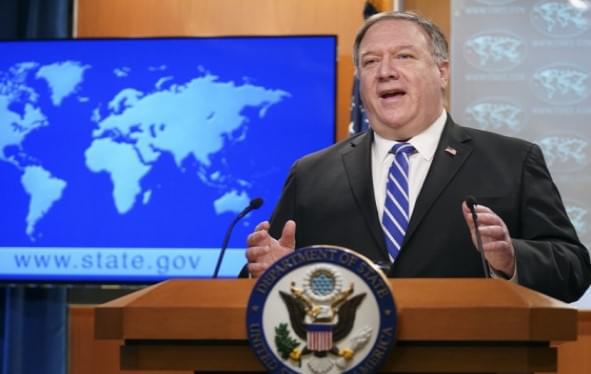WASHINGTON — The Trump administration on Wednesday ramped up pressure on Syrian President Bashar Assad, his wife, Asma, and his inner circle with a raft of new economic and travel sanctions for human rights abuses and blocking a settlement of the country’s bloody nine-year conflict.
The State Department said 39 Syrian individuals, including Assad and his wife, had been designated for the new sanctions. Others include members of the extended Assad family, senior military leaders and business executives. Many of those on the list were already subject to U.S. sanctions, but the penalties also target non-Syrians who do business with them.
Separately, the Treasury Department announced it has imposed sanctions on 24 individuals, companies and government agencies that “are actively supporting the corrupt reconstruction efforts” of Assad.
One newcomer to the U.S. blacklists is Asma Assad, who had not been previously targeted. She was cited as becoming what the State Department said was “one of Syria’s most notorious war profiteers.” Asma Assad has increasingly sought to centralize all charity work under her aegis and the Syria Trust for Development, where most foreign aid for postwar reconstruction is channeled.
The sanctions are the result of legislation known as the Caesar Syria Civilian Protection Act, named after the pseudonym of a Syrian policeman who turned over photographs of thousands of victims of torture by the Assad government.
“Today’s designations send a clear message that no individual or business should enter into business with or otherwise enrich such a vile regime,” White House press secretary Kayleigh McEnany said in a statement.
Secretary of State Mike Pompeo said the designations represent “the beginning of what will be a sustained campaign of economic and political pressure to deny the Assad regime revenue and support it uses to wage war and commit mass atrocities against the Syrian people.”
“Anyone doing business with the Assad regime, no matter where in the world they are, is potentially exposed to travel restrictions and financial sanctions,” Pompeo said in a statement.
Besides rights abuses, those targeted also were hit for obstructing a peaceful political resolution to the long-running conflict.
In addition to Bashar and Asma Assad, those designated on Wednesday include Assad’s sister Bushra; his brother, Maher, and his wife, Manal; Mohamed Hamsho, the head of the Damascus Chamber of Commerce; his wife, Rania al-Dabbas; his son, Ahmed, a show jumper in Syria’s equestrian team in the 2012 Olympics; and Ghassan Ali, a right-hand man of Maher Assad, and Samer al-Dana, who are leaders of the Syrian military’s Fourth Division.
Syria’s foreign ministry said the measures were a violation of international law and showed that U.S. officials were behaving like “gangs and bandits.”
The Damascus government also accused the U.S. of hypocrisy, saying that in light of the recent domestic unrest across America, the United States should be “the last to utter words about human rights.”
Even so, Wednesday’s announcement was widely expected, and ahead of it, Syria devalued its currency by 44%. Syria announced a new official exchange rate for the pound amid chaos in the market just hours before the sanctions took effect.
Syria’s already troubled economy has sharply deteriorated, prices have soared and the pound had collapsed in recent weeks, partly because of fears that the sanctions would further isolate the war-ravaged country.
Experts say the new sanctions will be a heavy blow to a nation where more than 80% of the people already live in poverty, according to the United Nations. Syrian government officials have called it “economic terrorism.”
Syria is already facing sanctions — some in place even before the war — imposed by the United States and European countries against officials or individuals linked to Assad’s government. The new sanctions will likely severely impact the inflow of foreign capital particularly for post-war reconstruction, especially from Russia and Iran, Assad’s main allies, as well as China and neighboring countries.
The Washington-based Syria Justice and Accountability Center said the Caesar sanctions are designed for this purpose, “aiming to deter foreign financial engagement and commercial reconstruction agreements with the Assad government.”
But the group said the sanctions also contain provisions exempting humanitarian goods and services, similar to other sanctions, and intended to ensure the flow of aid and mitigate the economic consequences of the sanctions on the Syrian people.
Still, the currency collapse is obviously in part deepened by the panic over the impact of the sanctions.
People are hoarding dollars, and many commercial transactions have stopped. The government, in an effort to control the flow of foreign currency and the exchange rate, has cracked down on hawalas, or offices of exchange that are used by the majority of Syrians, which has also impacted the flow of foreign currency in the country.
A financial crisis in neighboring Lebanon, where there are controls on withdrawals and a shortage of foreign currency, has also impacted the Syrian banking sector and Syrians who had saved or did commercial transactions through Lebanon. Iran’s own economic woes, and the economic impact of coronavirus restrictions in the region, have all added to the crisis in Syria.
“Ultimately, the most significant cause of the economic crisis is the Syrian government — its irresponsible fiscal policy, continuous corruption, refusal to respect international laws and norms or engage in good-faith political and diplomatic negotiations,” said SCJA in a report issued Tuesday, which added the sanctions offer a clear path for the Syrian government out of the sanctions.
Copyright 2020 The Associated Press. All Rights Reserved. This material may not be published, broadcast, rewritten, or redistributed. Photo: AP





















